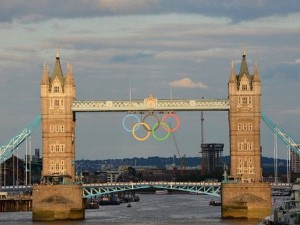Olympic organizers put cheerful spin on games woes

A general view of the Tower Bridge decorated with the Olympic ring symbol, in central London, on July 15, 2012, as Britain prepares for the beginning of the Olympic Games. The London 2012 Olympic Games will begin on July 27, 2012. AFP/MIGUEL MEDINA
LONDON — Lots of Olympics security guards didn’t show up for work – and two buses full of Olympians got temporarily lost on London’s winding streets – but the chief of the London Games says preparations are going just fine, thank you.
Organizers scrambled Tuesday to put the best face on an unfolding security debacle afflicting the games that start in just 10 days.
`’Let’s put this in proportion,” games chairman Sebastian Coe told reporters. “This has not, nor will it, impact on the safety and security of these games, that of course is our No. 1 priority.”
Yet his efforts were undercut Tuesday in Parliament, where the chief executive of the G4S security group acknowledged that his company’s failure to recruit enough Olympic staff had embarrassed the entire nation. Some 3,500 more British troops – including some just back from Afghanistan – had to be called in on short notice to fill the gap.
The head of G4S, Nick Buckles, gave a groveling mea culpa as he was being quizzed by angry British lawmakers in testimony that was broadcast live.
“It’s a humiliating shambles for the country, isn’t it?” asked Labour lawmaker David Winnick.
“I cannot disagree with you,” Buckles said.
Still, Buckles was hard-pressed to explain why his company had failed to inform officials until only two weeks before the start of the 2012 Olympic Games that its recruitment efforts had failed.
But the company will pay for its mistakes. G4S says it expects to lose between 35 million pounds and 50 million pounds ($54 million-$78 million) on the contract, which is equal to about 12 percent of its annual profit.
Making things worse, a couple of buses carrying Olympic athletes from Heathrow took a wrong turn Monday – the big day when athletes started arriving for the games, a showcase moment if there ever was one. And the special “games lane” that they traveled on forced other London drivers into a miles-long traffic jam.
The lost buses – one for Americans, another for Australians – touched a nerve. From the very start of the project, transport organizers have feared repeating the transport woes of the 1996 Atlanta Games, where one of the biggest problems was having bus drivers brought in from outside the city who didn’t know their way around.
That allegedly happened Monday in London, even though Heathrow sailed through its heaviest passenger day ever with short immigration lines and plenty of help for Olympic travelers.
“First day. First arrivals. It’s going to happen,” said Jayne Pearce, head of press operations.
Coe urged optimism, despite a Twitter storm that erupted when an American hurdler took to the social networking site to express his frustration for a four-hour bus ride from Heathrow to the Athletes Village.
“Apart from a mis-turning and a couple of tweets we’re in pretty good shape,” Coe quipped.